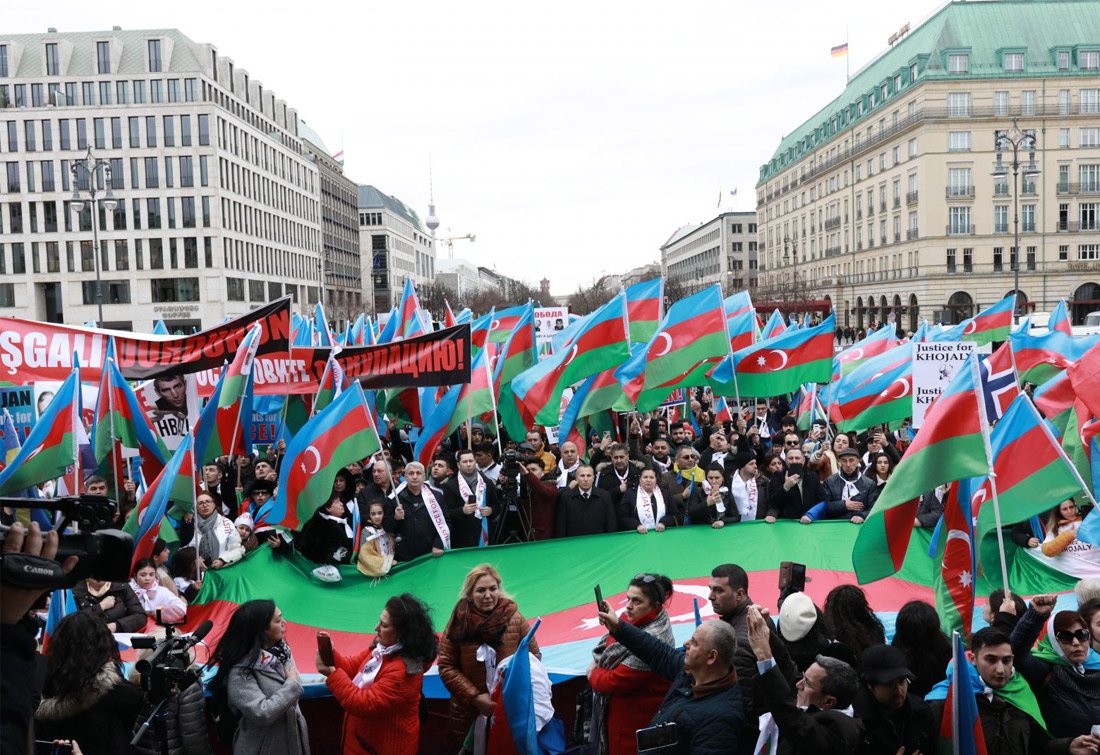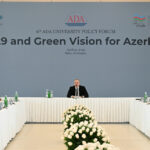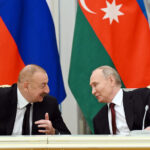This is an excerpt from the response to Aze.Media’s inquiry about the activities of the State Committee on Work with the Diaspora in 2020, in particular the Committee’s activities addressing the difficulties and challenges the diaspora faced during the global pandemic and the Second Karabakh War. We were also informed by the Committee that a total of 5 programs and projects had been implemented in 2020 with a total of 135 online meetings held as part of those initiatives.
Covid-19
In 2020, the Committee arranged a series of actions to prevent the spread of the COVID-19 coronavirus pandemic and began to take advanced measures to raise awareness among the employees of the Committee and to prevent the spread of the virus. In addition, contacts with Azerbaijani diaspora organizations, Coordination Councils of Azerbaijanis and Azerbaijani Houses were strengthened. The information on our compatriots received through them was processed, categorized and studied, and steps were taken to solve their problems. The Committee made an immediate decision to resolve the issues within its authority and capacity, and a number of requests were sent to the relevant agencies.
A total of 8,433 people received support to cope with the coronavirus pandemic on the basis of requests from the Ministry of Foreign Affairs, diplomatic corps of the Republic of Azerbaijan abroad and individual compatriots. Of these people, 1,578 were in need of evacuation, 2 had visa issues and 6,853 needed financial assistance. Evacuation requests were sent to the relevant government agencies and information support was provided to our compatriots.
From the first days of the coronavirus pandemic, Diaspora TV and Diaspora FM maintained contacts with Azerbaijanis living abroad and Azerbaijani traveling abroad and unable to return to the country. Diaspora television and radio broadcast information video and audio messages in Azerbaijani, English and Russian about the activities of the Committee, including the newly created email addresses to contact the organization regarding the pandemic-related issues.
During the pandemic, Diaspora TV’s “Homeland is not far away” program arranged more than 20 individual and group video calls with 52 of our compatriots, keeping the public informed about their situation and that of the Azerbaijanis living in those countries: in France, Italy, Lithuania, Russia, the United States, Belarus, the Netherlands, Spain, Great Britain, Austria, Hungary, Germany, Ukraine, Turkey, and a number of African countries.
The Fund for Support to Azerbaijani Diaspora also received a total of 170 requests for assistance due to the spread of the novel coronavirus from March 26 to July 1, 2020. 143 of them came through the Committee, 27 were made personally or sent electronically. The incoming requests were reviewed, the necessary documents were collected, and a total of 84 people, including 67 students, received assistance.
In total, 143 educational and information materials on the COVID-19 pandemic were posted on the Committee’s official website from March 26 to July 1. 97 materials (articles) on the activities of the Azerbaijani Diaspora during the pandemic appeared on 256 sites.
Armenian provocation in Tovuz (July 12, 2020)
Following the July 12 provocation in Tovuz (Armenia’s military provocation on the Azerbaijani state border in Tovuz District), which is considered the harbinger of the 44-day war, the Committee immediately took appropriate steps within its authority to get Azerbaijanis living abroad to take a stand on the matter.
The committee appealed to Azerbaijanis around the world, compatriots, Azerbaijani diaspora organizations, as well as diasporas of friendly nations, asking to send all photo and video facts about the crimes committed by Armenians to www.diaspora.support, diplomatic corps and accredited diplomatic missions of the Republic of Azerbaijan, Coordination Councils of Azerbaijanis or Azerbaijani Houses abroad. Compatriots were urged not to respond to provocations—the struggle should be carried out entirely within the bounds of the laws of the countries of their residence.
Azerbaijanis living in different countries of the world launched organized campaigns, protesting against the occupation policy of Armenia, the provocations committed by the Armenian armed forces on the state border near Tovuz District of Azerbaijan. Demonstrating strong unity, Azerbaijanis living abroad demanded that the states of the world and international organizations facilitate the liberation of the Azerbaijani lands and put an end to Armenia’s occupation policy.
Azerbaijani Diaspora during the Patriotic War (September 27 – November 10, 2020)
In the period from President Ilham Aliyev’s address to the nation on September 27, 2020, the first day of the hostilities that went down in history as the Second Karabakh War, to November 10, the Diaspora Committee addressed Azerbaijanis around the world—the Azerbaijani Diaspora organizations, as well as the diasporas of friendly nations five times: on September 27, October 4, October 21, November 7 and November 10. A 24/7 hotline was arranged for prompt response, a working group operating in shifts was set up and an action plan was drafted and approved.
After the Committee’s address, letters, appeals and statements were sent to presidents, state and government officials (including chancellors, ombudsmen), foreign ministries and local governments of different countries, the UN Security Council, NATO, the OSCE, the Red Cross and other international organizations until 27 October 2020. As of November 10, 2020, 385 statements (appeals) in 23 languages by 265 diaspora organizations and international organizations in 46 countries, including 126 organizations represented in the 12 Coordination Councils of Azerbaijanis covering 26 countries, and communities in Azerbaijan, were sent to presidents and members of parliaments of different countries, UN, European Parliament, Council of Europe and other international organizations. 775 statements were sent to members of the European Parliament, and statements and appeals were sent directly to 641 members of parliaments of different countries.
12 Coordinating Councils operating in different countries sent to world leaders, international media representatives, influential organizations, parliaments and prominent public figures of different countries 4,700 emails with detailed information in different languages on Armenian provocations, occupation policy and terrorist activities.
The first address of the Committee (September 27) called on our compatriots not to spread unofficial, unconfirmed, biased information on social networks and in mass media and on every Azerbaijani living abroad to be active in informing the world of Armenia’s acts of provocation and sabotage, as well as of Azerbaijan’s rightful position, and in disseminating accurate information on current events on the frontline.
The second address (October 4) called on our compatriots to morally support the righteous struggle of the Azerbaijani army by sending appeals, letters and statements to presidents, parliaments, state and public institutions of the countries of their residence, and to step up their activities in order to get the accurate information across to the international community as part of information war, stressing that the Azerbaijani army has enough manpower.
The third address (October 21) informed that the occupying Armenian army was targeting civilians in Ganja, Mingachevir, Barda and other areas outside the combat zone, and advised our compatriots not to respond to Armenian provocations and to be vigilant.
The fourth address (November 7) called on the Azerbaijani Diaspora in Ukraine to be vigilant, not to respond to Armenian provocations and to act only within the laws of Ukraine.
In its fifth address (November 10), the Committee thanked the diaspora for the remarkable display of selflessness during this important and sensitive period of Azerbaijan’s history, saying that the victory of our people is a symbol of our unity.
According to the Committee, more than 300 video conferences with thousands of Azerbaijanis from 60 countries were organized from September 27 to November 10. The Committee and representatives of the Diaspora also prepared a total of 355 articles reflecting the realities of our country in 26 languages and disseminated them through various newspapers, websites and popular news portals in 43 countries.
At the same time, animation and video reels were made to broadcast images of Armenia’s crime under international law against civilian population on car-mounted digital billboards. Cars with slogans expressing the just position of our country drove around Boston, Washington, New York, Chicago, Stockholm, Berlin, Ottawa, Toronto, Montreal, London, Riga, Sydney, Brisbane and other big cities, and the words “Karabakh is Azerbaijan!” were highlighted on advertising billboards in different countries.
After the Second Karabakh War ended with our victory and the trilateral statement signed on November 9, Azerbaijanis living abroad continued their work in support of our state and our army. Following the decrees of President Ilham Aliyev “On the establishment of Victory Day in the Republic of Azerbaijan” and “On the establishment of the Memorial Day in the Republic of Azerbaijan”, the Azerbaijani Diaspora was appropriately informed and other actions were taken in this regard. In particular, a series of events were held to mark the World Azerbaijanis Solidarity Day, December 31, the holiday of all our compatriots. A total of 83 activities were carried out in this area.
The Shusha Declaration
The Shusha Declaration signed by the President of the Republic of Azerbaijan Ilham Aliyev and the President of the Republic of Turkey Recep Tayyip Erdoğan in Shusha on June 15, 2021 gave certain tasks and responsibilities to the State Committee on Work with the Diaspora. The Declaration envisages closer cooperation between the Azerbaijani and Turkish diaspora organizations in different countries, for joint efforts to act together and demonstrate consistent solidarity in the face of common problems, as well as representation of both countries and protection of national interests, coordination of diaspora activities to get historical facts across to the international community and promotion of mutual support.

Commenting on the relevant provision of the Shusha Declaration, the State Committee on Work with the Diaspora said that the Memorandum of Understanding on cooperation in the field of diaspora policy between the Committee and the Presidency for Turks Abroad and Related Communities (YTB) would lead to closer cooperation on the basis of the new provisions arising from the Shusha Declaration. Thus, instead of exchanging experience in the countries where diaspora organizations operate, the priority areas of joint activities will be determined, and the issues of transition to new joint coordination councils will be on the agenda.
Speaking about the inter-diaspora issues reflected in the Shusha Declaration, Chairman of the State Committee on Work with the Diaspora Fuad Muradov said that it had been drafted with a focus on the future: “This historic document opens new horizons for the strategy of joint activity of the Azerbaijani and Turkish diasporas, as well as the diasporas of Turkic-speaking countries in general. Giving moral impetus to our diasporas, the Declaration not only defines national priorities in this area, but also sets very serious tasks for us as a new road map. This is a great contribution to our goal-oriented and active partnership. It will stimulate the development of our cooperation. The united diaspora movement will become more organized and more effective in strengthening the Azerbaijani-Turkish alliance by fulfilling the important tasks and functions set before us. Thus, the slogan ‘One nation cannot have two diasporas’ will be proved not in word, but in real life.”

Conclusion
The State Committee on Work with the Diaspora came a long way in the development of cooperation with its counterpart agencies in several countries in 2020. 7 activities were carried out in this area. 6 events were held in the framework of relations with local and foreign government agencies. 18 activities were carried out in the area of adaptation and integration of Azerbaijanis living abroad into the societies of the countries they live in, and expanding their social and cultural involvement.
A lot of work was done in 2020 to establish new diaspora organizations, to keep up meetings of existing diaspora organizations, and to involve Azerbaijani youth in diaspora work—36 activities were carried out in this area.
The number of activities to raise awareness of the Azerbaijani realities in the international arena reached 155 in 2020. The events dedicated to the 30th anniversary of the January 20 tragedy and the 28th anniversary of the Khojaly genocide made up a large portion of those activities.
A series of events was also held to promote the rich national cultural heritage of Azerbaijan, to mark events of national importance, holidays and remembrance days. The number of various activities carried out by the Azerbaijani Diaspora in this area is 76. 21 lobbying-related actions were taken, and 113 articles on the activities of the Azerbaijani Diaspora and dedicated to our country with the support of the Diaspora were published in foreign mass media.
Aze.Media
If you want to contribute and have specific expertise, please contact us at [email protected]













